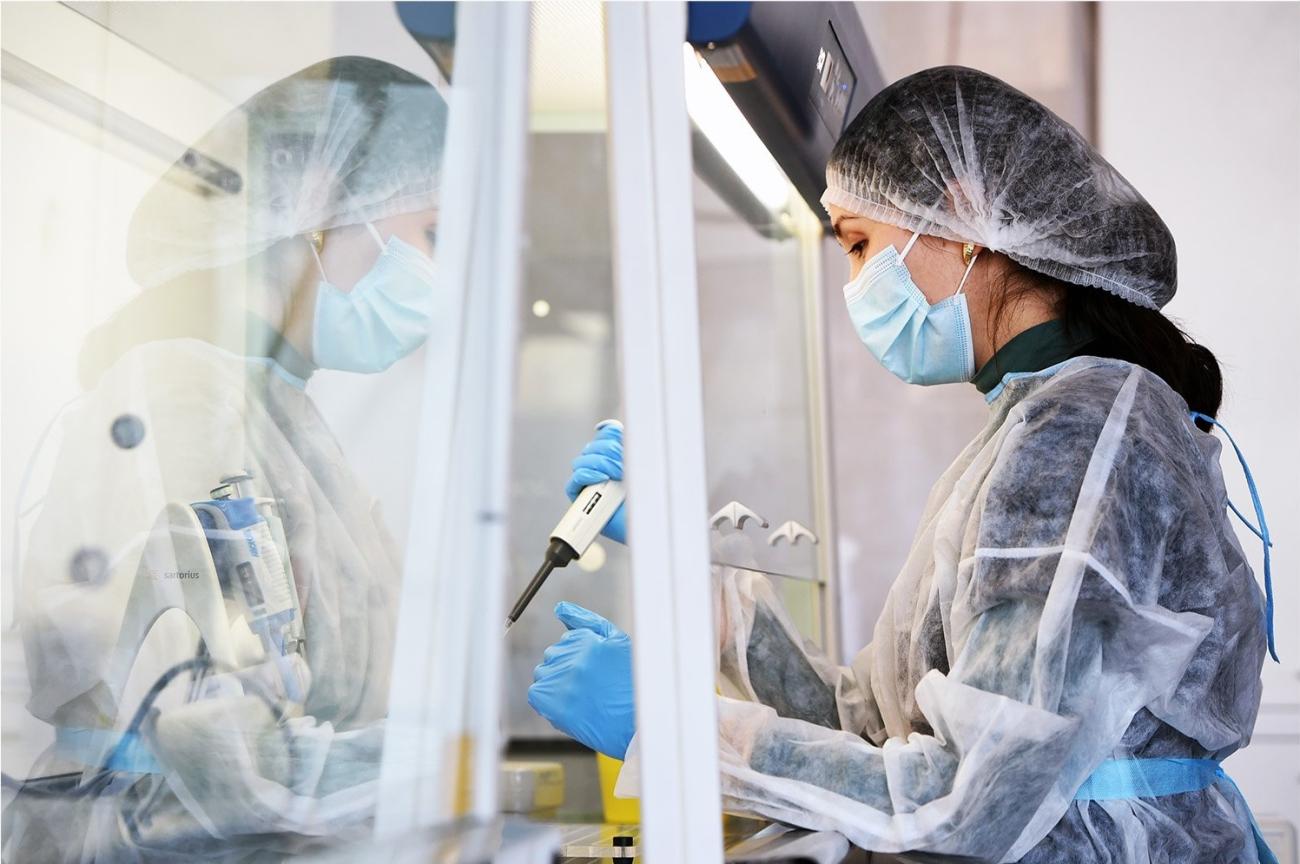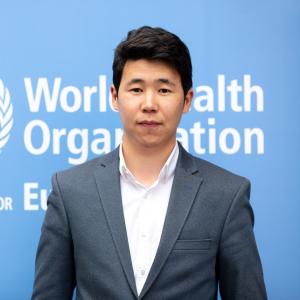A story from a virologist in Kyrgyzstan: better labs as a bridge to a stronger health system

A story from a virologist in Kyrgyzstan: better labs as a bridge to a stronger health system
Well-functioning laboratories are essential for improving health care and public health in Kyrgyzstan. Accurate laboratory results help to diagnose patients at risk of cardiovascular diseases, which currently cause every second death in the country. Laboratory testing for sensitivity to anti-tuberculosis drugs is also needed to find appropriate treatment for patients with multidrug-resistant tuberculosis (MDR-TB), another high-burden disease in Kyrgyzstan.
Today Dr Erkingul Baltabaeva shares her views on why laboratories are also important for protecting public health through detecting and controlling infectious diseases and preventing outbreaks. She has been working as a virologist for many years and joined the Department of Disease Prevention and State Sanitary and Epidemiological Surveillance under the Ministry of Health last year.
WHO improves the capacity of health workers and strengthens the role of laboratories
Dr Baltabaeva is one of 96 laboratory specialists who had been trained in the diagnosis of COVID-19 infection by WHO. The training involved local polymerase chain reaction (PCR) method experts from the National Tuberculosis Center, AIDS centers, Republican Center for Quarantine and Especially Dangerous Infections, State Centers for Sanitary and Epidemiological Surveillance of Bishkek and the Jalal-Abad, Osh and Issyk-Kul regions, and private laboratories.
The training was developed to equip laboratory specialists with basic skills for the diagnosis of COVID-19 infection. Dr Baltabaeva, together with her colleagues, also received face-to-face training in biosafety in laboratory settings and in working with high-threat pathogens and dangerous materials, as well as training in safe collection, transportation, processing, and preparation of samples for further testing.
As Dr Baltabaeva states, “I deepened my knowledge and laboratory experience through this training. It covered a lot of practical skills, which was extremely helpful.”
“We’ve been working around the clock during this pandemic to meet testing requirements and accomplish our mission – and we’re still doing it,” she continues. “We realize that COVID-19 will stay with us a long time. At the same time, the knowledge and skills received through the WHO training will stay with us forever. Of course, we will continue to sharpen our knowledge and skills because we always have to be ready for new threats.”
Further strengthening capacities in the country
Since the start of the COVID-19 pandemic, WHO successfully trained over 500 health workers from intensive care units, the Republican Clinical Infectious Diseases Hospital, primary health-care centres, and 2 military hospitals in the clinical management of COVID-19 patients. The improved capacities of the health workers and the supplies and equipment provided to hospitals and isolation centres helped to ensure the provision of appropriate clinical care for patients and a safe environment at health facilities for all during the COVID-19 pandemic.
In addition, WHO continues to provide the Ministry of Health and technical experts with updated evidence, recommendations and WHO guidelines on prevention, laboratory diagnosis and treatment of COVID-19 and other high-threat pathogens.
Dr Baltabaeva remembers that early in the COVID-19 pandemic SARS-CoV-2 variants had begun emerging in countries around the world, but laboratories in Kyrgyzstan were not able to determine whether any of them were circulating locally. However, WHO assisted in sending the samples to international WHO reference laboratories for sequencing, which made it difficult to monitor the epidemiological situation in real time. Thanks to WHO and other partners, genomic sequencing capabilities were established in the country, which was a notable public health success.
WHO’s Better Labs for Better Health initiative
Since 2015 Kyrgyzstan has been implementing WHO’s Better Labs for Better Health initiative. As part of the initiative, WHO leads and coordinates the efforts of national health authorities, donors, and development partners to build national laboratory capacity in different areas, such as policy-making, introducing and implementing national and international quality standards, strengthening laboratory services, and training laboratory specialists.
In recent years Kyrgyz health authorities have been establishing national standards for laboratory certification and a quality management system for laboratory research. To prepare national laboratories for accreditation in accordance with the international standard ISO 15189, Kyrgyzstan has introduced a mentoring programme for laboratories. Addressing the need for human resource development, the country has evaluated and updated the national training curriculum for laboratory personnel.
Such a comprehensive and coordinated approach enables Kyrgyzstan to optimally spend limited resources and gradually improve laboratory services with the overarching goal of strengthening the country’s health system and public health. For example, between 2013 and 2018 the number of laboratories accredited in accordance with international standards grew from 11 to 25. And the recently introduced HIV testing guidelines and new diagnostic techniques on TB and MDR-TB have significantly reduced the time needed to identify cases, ensuring early treatment initiation, as well as reducing and controlling further transmission.
WHO provides supplies of laboratory kits and personal protective equipment
Since the beginning of the COVID-19 pandemic WHO delivered to Kyrgyzstan personal protective equipment and provided PCR test kits for COVID-19 response and laboratory confirmation of positive results. In addition, WHO handed over supplies of laboratory consumables for sample collection and testing.
WHO continues to support the Ministry of Health with COVID-19 response trainings for health-care workers, including laboratory, primary health, hospital, and public health specialists.
Написано



